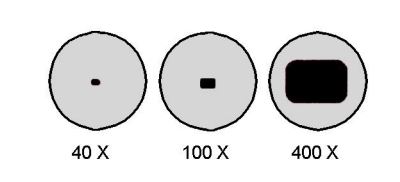This organelle is found on the endoplasmic reticulum and creates proteins
ribosome
This is bigger than a molecule but smaller than a cell
What are macromolecules
This shows the concept of:
:max_bytes(150000):strip_icc()/diffusion-in-water-530463502-5766aaec3df78ca6e4a98185.jpg)
diffusion
In addition to a cell membrane, plant cells also have a a _________
cell wall
What makes prokaryotes different than eukaryotes?
no nucleus and lack of membrane bound organelles
What are two similarities between prokaryotes and eukaryotes
cell membrane, ribosomes, DNA, cytoplasm
This is where cellular respiration occurs
What is the mitochondria
What concept does this diagram show?

field of view
This describes the movement of water from high to low concentration
osmosis
This category of cells are mostly unicellular and have a nucleus
Protist
This is a _______and what does it do 
mitochondria, cellular respiration
These are the products of cellular respiration which are needed for photosynthesis
Water and Carbon Dioxide
This refers to how much of the specimen is in focus
Depth of field
What things can easily pass through the cell membrane
(small uncharged molecules)
Which one doesn't belong (and why?) Bacteria, Fungi, Plants and Animals
Bacteria (since it doesn't have a nucleus). The rest are eukaryotes
Solve this riddle: Since I contain many enzymes, I can digest an injured cell, And can break down a large molecule into a smaller one as well
Lysosome
_________ (from food) is a starting material for cellular respiration. Once broken down, _____ is produced which is the energy currency of the cell
glucose (sugars), ATP
_________ also referred to as 'false feet", ___________ uses these for locomotion
Pseudopodia, amoeba
This is the term used to describe how some things (but not everything) can pass into or out of the cell
What is selectively permeable
Unlike an animal cell, plant cells have these 3 organelles
Cell Wall, Chloroplast, Large Central Vacuole
Hint: This is a tricky one! This is a __________, it also has __________ for locomotion:

bacteria, flagella
The blue food coloring water was clear after moving throug the charcoal dust, showing that it did a better job of taking in the food coloring than the big pieces
You saw this with elodea under the microscope. What is the movement in the process called and what are those green things?

cytoplasmic streaming, chloroplast
Explain what happened here (hint it's from our lab):

Salt water was placed on the onion cells. There was less water on the outside of the cell and the water moved out. This called the cell membrane to shrink.
What is this? And explain how you know.

Paramecium (type of cilliate protist). Single celled, has cilia